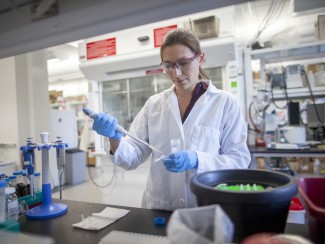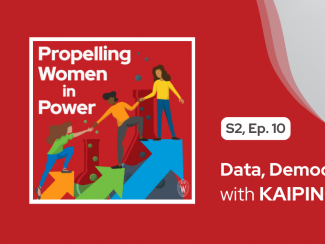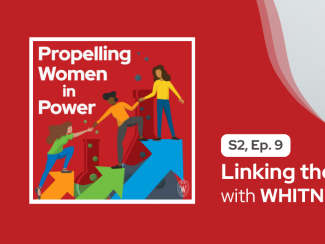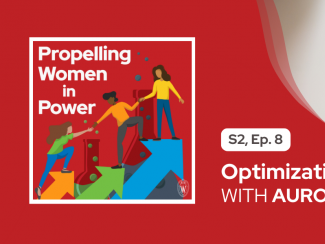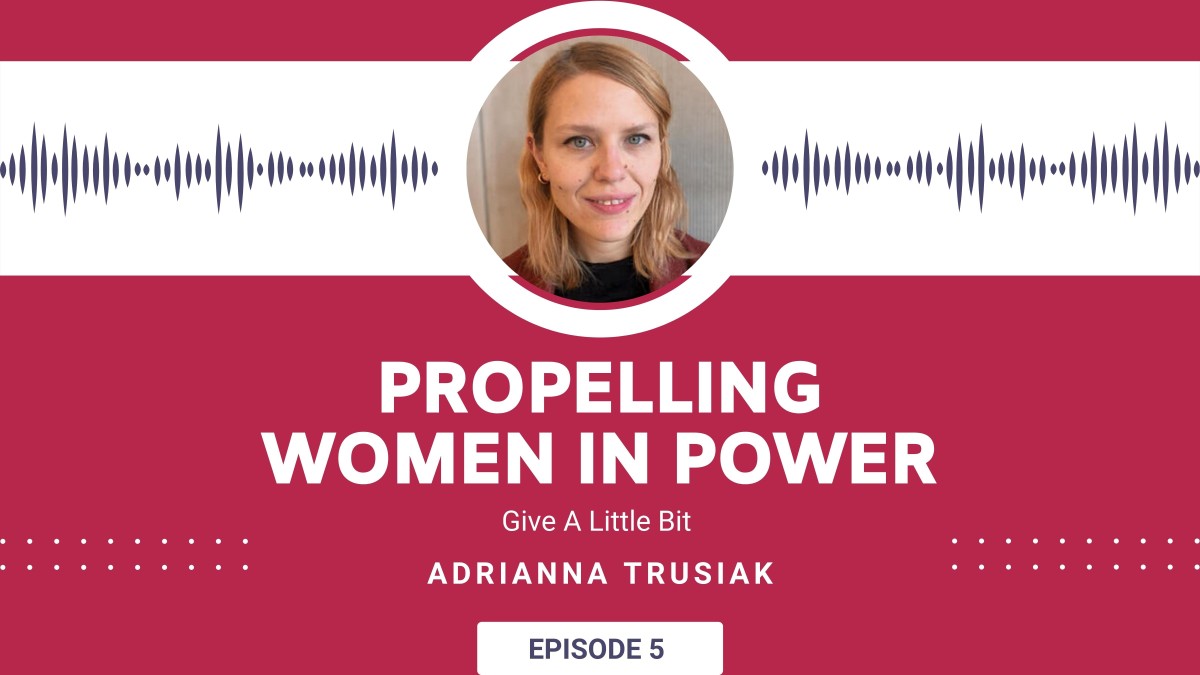
What happens when the thing you thought you wanted turns out to be different than what you expected? This week, Great Lakes Bioenergy Research Center Research Coordinator Adrianna Trusiak talks about the pressures of grad school and the tough choices she made to shift her career path. Trusiak also gives insight on how following her passions led towards a job that accentuates her skill in building meaningful relationships in work and play.
Listen right now on Spotify, Apple Podcasts, Google Podcasts, or anywhere podcasts are found. Or click the play button below!
Hosts: Mary Riker and Michelle Chung
Editors and Producers: Mary Riker, Michelle Chung, Mark Griffin
Music written and performed by Mark Griffin
Transcript
Mary Riker: Hi, Michelle.
Michelle Chung: Hey, Meg.
Mary Riker: Have you ever had a job or situation professionally where it wasn't what you expected or needed the outcome of it to be?
Michelle Chung: I think that most of the jobs that I've had turn out to be something that I didn't expect. And that can be either good or bad. And I think whether it's something that I needed depends on whether that was good or bad.
Mary Riker: I agree with that. Every position that I've had has always turned out into something that I didn't expect at the beginning, but for the most part it's been a good thing, right? It’s been beneficial.
Michelle Chung: Yeah, and those things that you don't expect are like those factors where you learn whether or not you like something or you don't like something about that job or an aspect about that job.
Mary Riker: Today we talked to Adrianna Trusiak who is a research coordinator at the Great Lakes Bioenergy Research Center, who had that experience during her Ph.D., where she expected it to be a lot of like lab and field work. But she ended up saying that only two out of the six years of her Ph.D. were actually dedicated to that, and the other four were dedicated to analyzing the data and figuring out why she had all these outliers.
And that she didn't expect that. And this ultimately kind of turned her onto a different path of being a research coordinator where she can connect with people and help them realize what they want to.
[MUSIC]
Michelle Chung: Welcome to Propelling Women in Power, a podcast about the careers of women in energy at the Wisconsin Energy Institute on the UW Madison campus and our sister institution, the Great Lakes Bioenergy Research Center.
Mary Riker: I am Meg Riker and I am a junior undergraduate student studying civil engineering. I am a science writer intern with a passion for meeting people from different scientific disciplines and sharing their stories.
Michelle Chung: And I'm Michelle Chung, a senior undergraduate student studying biology and environmental studies. I love finding fun ways to highlight the research and people here at WEI and GLBRC.
Mary Riker: Here we talk about women scientists and engineers career paths, the obstacles they have faced, and most importantly, their advice for young women scientists and engineers.
Michelle Chung: It is our goal to highlight their individual experiences, mentors and work life balance while seeking advice for young women in science and asking the question: who and what facilitated your success?
Mary Riker: Today, we talked to Adrianna Trusiak who is a research coordinator at the Great Lakes Bioenergy Research Center at Michigan State University. After immigrating to the United States from Poland with her family when she was 16, she attended the City College of New York to study geology. After her bachelors she earned her Ph.D. in aquatic geochemistry from the University of Michigan Ann Arbor and worked at the Arctic Long-Term Ecological Research Program in Alaska prior to joining the Great Lakes Bioenergy Research Center.
She coordinates three different research groups within the center and is the point of contact for the center's outreach activities at Michigan State University. She is passionate about sharing science and research opportunities with others and hopes that this will break down the barriers between science and the public.
Michelle Chung: Let's take it away with Adrianna.
[MUSIC]
Adrianna Trusiak: My name is Adrianna Trusiak. I have a Ph.D. in water geochemistry that I got at the University of Michigan, and then I went to the Michigan State University, to work as a research coordinator at the Great Lakes Bioenergy Research Center. And what I do as a research coordinator is really support researchers, help them write proposals, support their teams, and just make sure all the research is done and that we are reporting back to our funding agencies.
Mary Riker: You mentioned you did your Ph.D. at Michigan. How did you decide you wanted to do a Ph.D.?
Adrianna Trusiak: So it wasn't something that I ever thought I would do. I didn't even know there was such a thing, really. And in undergrad, I was very undecided about what I wanted to do. I was thinking I would go for pre-med and go to med school because that's what my parents were expecting. And then I found, I worked, in Environmental Sciences, and I started studying that, and I really enjoyed that.
And I started doing research as an undergrad in the lab. And I did research for two and a half years, and I loved it so much. So it seemed like a very natural transition to become a Ph.D. student because I thought they do research too, and I would just continue doing what I want. I think the reality varied a little bit of what doing a Ph.D. was. Finishing undergrad, even though I was doing what I liked, I wasn't sure what career I wanted.
And my mentor, who was a person I was doing research with, you know for her, she was like, you're great at research, so you have to continue. And Ph.D. seemed like a pathway where I could continue doing what I was doing, and so I went with it.
Mary Riker: It's interesting that you bring up that you had a mentor in your lab. Could you tell me about them a little bit?
Adrianna Trusiak: Yeah. So I took an intro to geology course in undergrad with Professor Karin Block at City College of New York and I loved that class. And she was such a great teacher. I still, to this day, it's the only class that I read the entire textbook front to back. And it was mostly to also impress her. I really wanted to do well in the class.
As the semester was ending, I went up to her and I asked, you know, I would like to do research with you. And she said, yeah. Show up on, you know, January 2nd and and you can do research with me. And I think she wasn't sure if I was going to show up, but I, I did. And then I never missed a day in lab ever since, basically.
And she grew to be really this mentor for me, both in the academic world and in research as well. And it was really great. Like she was very supportive of women in science and just trying to bring in diversity.
Mary Riker: I'm sure it's nice to have that kind of like role model to look up to during college. I know, and I've had people for me, there's such a positive guiding force that it can be very helpful to have that, especially as a young adult. So when you started your Ph.D., you thought it would be just research, but it turned out to not to be? Or to be something kind of different?
Could you tell me a little bit more about that?
Adrianna Trusiak: Yeah. So, you know, Ph.D. what I said is I will continue to do research and ask scientific questions and run these lab experiments. And I wanted to do a Ph.D. that was a lot of hands on lab work as well as field work. But, you know, that took two and a half years out of my six years of Ph.D. And then the rest, what comes down is the data analysis and sitting in front of your computer trying to figure out why, you know, you have all these outliers and how can you, you know, test your hypotheses.
And if you don't get clear answers, like figure out how you can test them more so you can get data that's publishable. And then writing papers to be published in scientific journals takes a really long time. My graduate advisor was a great mentor and she she was great in mentoring for writing and wanted to make sure that our publications were clear and that it wasn't just meant for scientists who are in the field, but it was meant anyone could understand them.
And the writing was really clear. But that meant for each one of my publications, like it took over a year to write each one. And that's, we're not talking about a book. We're talking about, you know, 20 to 30 pages of writing. And so I, I just realized I didn't enjoy that part as much. I could do it, but I didn't enjoy it as much as just being in the lab.
And I couldn't be in the lab anymore because I, I needed to publish. That was the next kind of what happens in your PhD. And I wasn't prepared for that. I didn't know that that's what I was signing up for.
Mary Riker: Was it difficult to reconcile putting this idea of like years of your life into something, or is that something you were looking forward to? How did you feel about it when you went into it?
Adrianna Trusiak: Oh, I think it was exciting for me because it was a set goal for five or six years. I think it was harder at the times when I was having a really hard time and I was thinking like, this isn't for me. Maybe I should leave. It was hard to be like, oh, I put four or five years already of my life into this and now I'm just going to leave without anything.
Mary Riker: You felt at some point like you should leave? Could you talk maybe more about that and like any obstacles that you faced or why you felt that way and then how you overcame it?
Adrianna Trusiak: So I would say from all of my friends, I know maybe 10% have not felt, who were doing a Ph.D., like maybe 10% have not felt like they should leave without. So I think you just reach a point where this is very taxing. And I do think that, unfortunately, it doesn't have to be that way. We have this culture of sometimes academics say that until you reach a point in your body where you feel like you're going to quit, you're not doing it right, that you have to, like, drive yourself to this point of like you can't.
You feel like you can't do it, and that's when you know you're doing it right. But there is a lot of pressure on just you need to work all the time and you shouldn't be doing other things. And your research is your life priority. And there is the imposter syndrome when you know you feel like you're not good enough.
And so I think it just was weighing on me and I experienced all of those things. It was a combination of those things.
Mary Riker: So was there anybody specific like in your life that you turned to? Or like sounds like maybe your fellow students were definitely a support group for you?
Adrianna Trusiak: Yeah, I think that's the big priority is having friends who are going through the same thing and talking to them because it's easy to become competitive with each other. But ultimately sticking together and sharing experiences makes us relatable to each other, that we're both going through the same things and having the same feelings or dealing with the same issues.
For me, that has really helped me to get through those points. And for me, the other things is like I realized that I need to have a life outside of my Ph.D to be happy. So I really prioritized work life balance. I started volunteering and that actually ultimately made me more productive as a student.
Mary Riker: Why do you think most of the Ph.D. students have this kind of collective imposter syndrome, or does it only impact like one group or minorities or women? What what would you say your experience with that was?
Adrianna Trusiak: I think in general, everyone experiences that, and I think it's because you think everyone else is smarter than you. But I do think it's more prominent in women and minorities and people underrepresented in science because on top of having these general feelings, you know, you feel like your group has to maybe prove themselves more. I’ve gotten statements from colleagues of like, oh yeah, you got that scholarship because you're a woman or you're an immigrant and you know, like you filled that box.
Mary Riker: Is there any way that you specifically combat that when someone says, oh, you got this because you're a woman or you got this because you're an immigrant? Are there people you turn to or kind of things that you look at or maybe a worldview that you have that lets you build yourself back up from that?
Adrianna Trusiak: In general, I try to remind myself what I had to go through to be where I am and how long it took me to learn some things, because I had to learn them on my own because I didn't have a parent who could teach me. I think just remembering that, that has really helped me to kind of see, you know, like maybe they don't see that side of my story.
Mary Riker: I think that's a really important thing to highlight. We have to build each other up, but personally, we have to step back and think like, I can do this and I can do this because I want to do this and I've worked for it. So to me, that's definitely kind of a way that I cope with it. And it seems, it sounds like that personal level, having that personal like core strength is definitely something that's important.
Adrianna Trusiak: Yeah, I think it's so easy to like, you know, forget that you've accomplished things too, especially in that moment. And I think sometimes it just helps to even list a few items, just, you know, things I've accomplished on my own. And you know, to remind yourself.
Mary Riker: I was thinking about this the other day like we're scientists, right? We want to encapsulate all these different variables. We want to figure out all the relationships between all these different variables. But if we don't have the perspectives of all these different people, how are we going to actually see all those variables? Because there's things that I don't see, because I'm not a person of color or not an immigrant, something like that, or not a man.
And I think that's important to recognize. Like when we bring people into our spheres, we bring all the variables that they have.
Adrianna Trusiak: Yeah. And it's so important to recognize how your background also might impact things. So I think for me, with mentoring, like sometimes one thing that's missing is, you know, recognition that different people have different support needs and one grad student might be able to work 12 hours or, you know, a super long shift or something, and they would be happy to do so.
And there might be someone else caring for their parents or having to do something else. And so we need to just be understanding and listen to people and their needs and adjust the expectations.
Mary Riker: Do you think there's any sort of institutional level change that can be done?
Adrianna Trusiak: I think having certain, general rules that applies to, you know, department or schools, even about vacation. You know, like when I started grad school, I didn't think about vacation time. And then I was scared to ask my advisor to take vacation time. And, you know, even when I was on vacation, I felt like I should be on email and I cannot be MIA.
I need to respond to emails. It would be nice if, like the institution signals to students they get two or three weeks of vacation time, you know. That you don't expect them, you know. For grad students doing research, it's hard to limit hours because like, especially if you're running experiments, there might be really long weeks or you have to work longer hours.
But you know, putting these other things in context of saying, you know, like you don't have to work weekends unless necessary or something.
Mary Riker: You work as a research coordinator, which is not an academic position, but you went through with this intense academic degree. So what drew you to be being a research coordinator?
Adrianna Trusiak: It wasn't an easy decision because the expectation is you're going to, you know, do a postdoc and then start your own lab and become a professor. I felt very burned out after my Ph.D. and I wasn't excited about the science. I kind of lost that spark and that excitement of asking questions. And I you know, I had multiple postdoc opportunities that I just interviewed, and it just felt like I would be postponing this process of kind of figuring out what I want to do.
And so I made the decision that I wasn't going to go into academia. And it was a very hard decision. And like you said, you know, after this strict regimen, of going through grad school. So that was very hard. It was a hard decision to make, but I knew that was the right decision for me. And then I really wanted to do science support.
You know, once I found this position, I really liked that it was more administrative. I actually really enjoy administrative type of work, and I like that I would still learn about science. I could actively support the science.
Mary Riker: You said that even after you left academia, you had this continuing kind of imposter syndrome around that. It sounds like this imposter syndrome follows us from academia. Do you have any insights about why that is and why it continues to be that way, or if we can change it in the future?
Adrianna Trusiak: Yeah, I think it follows anyone and I'm sure if I became a young professor, it would manifest in other ways. And ultimately I think we live in such a culture of comparisons and I think this is stronger for women because since you were young, you know, like looks were compared to other girls and, you know, I think these things mattered more than they they do for men from the younger age.
And I know, and I think that comparison carries on and transfers to their career. And are you doing enough?
Michelle Chung: Are there, like specific things about what you've learned through your personal experience that you would want to share with someone that you're mentoring?
Adrianna Trusiak: Giving a little input of your personal life. Like maybe, I think just giving, you know, some specific examples. So when I was mentoring an younger grad student, I remember I said something like, oh my God, I have to call Time Warner Cable again for my parents because their Internet is so slow. And it's like I was in Michigan, my parents are in New York City, but they don't speak English.
So like I have to deal with things for them. And she was like, oh, wow. Like, you have to do things like that. Just like I have to do things for my mom sometimes, too. And I think it was this moment of, oh, you know, we're very similar in some ways and have to struggle with these similar things.
And, then we started talking about this shared experience. I think opening up, having these tidbits where maybe you can connect can really help. And I think the other thing, too, that I would want to incorporate is just asking people how they're doing. How are you feeling about what's going on in your life and what's even, what's going on with your project instead of just like you know, what work have you done?
And having this more personal connection and providing some more emotional support is crucial to. So I think bringing that vulnerability and showing that you are a normal human being with parents and with insecurities or, you know, with something happening in your life is really, it's really good and it helps to build up to relationships.
[MUSIC]
Mary Riker: All right, Michelle, after listening to what Adrianna had to say and considering her path, what do you take away from this as a graduating senior who's moving on to something new in your life?
Michelle Chung: I think after listening to Adrianna’s story and how she had a pretty winding path, she didn't know what she was getting into. I'm fully expecting to do things that I might not enjoy, but always with the outlook of knowing that I'll know more about myself afterwards.
Mary Riker: Which is the goal, right? I mean, in life, that's all you can ask for.
Michelle Chung: That's all you can ask for with the experiences that you make is that you'll learn something from them.
[MUSIC]
Mary Riker: Absolutely. And that's our show. Thank you to everyone listening, we’re your hosts, Meg Riker.
Michelle Chung: And Michelle Chung.
Mary Riker: This show was edited and produced by us and Mark Griffin. Thanks again to our guest, Adrianna Trusiak, a research coordinator at the Great Lakes Bioenergy Research Center at Michigan State University.
Michelle Chung: And see you next time, on Propelling Women in Power.
Michelle Chung: Oh, okay. We have one final question for you, and that is, what's your superpower?
Adrianna Trusiak: I'm very good with gift giving. I guess it came up because it was just holidays, but I'm very good with gift giving. So I would say that's my superpower.

